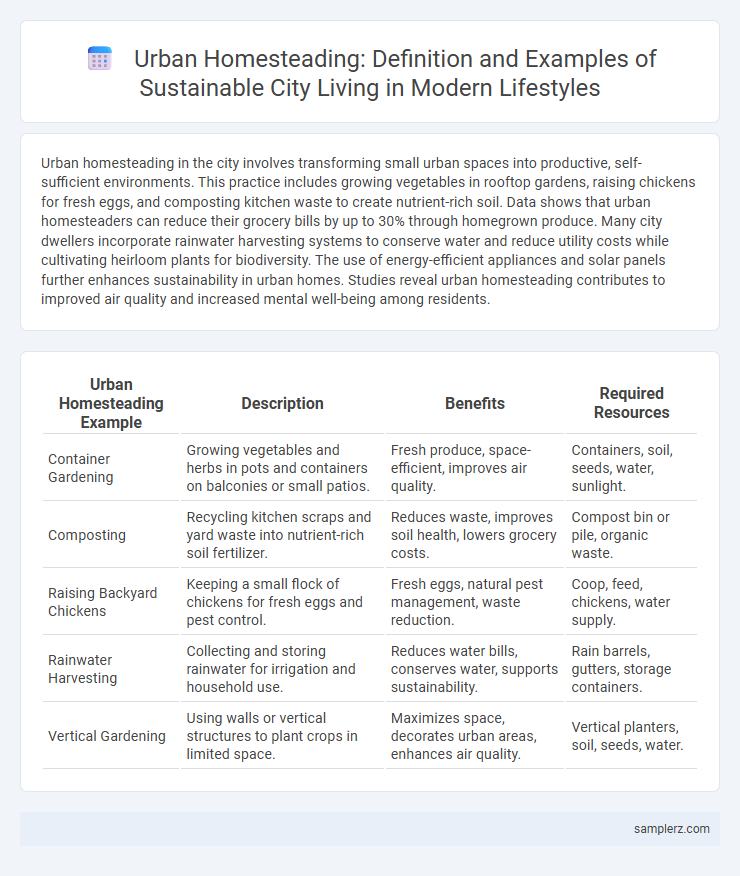Urban homesteading in the city involves transforming small urban spaces into productive, self-sufficient environments. This practice includes growing vegetables in rooftop gardens, raising chickens for fresh eggs, and composting kitchen waste to create nutrient-rich soil. Data shows that urban homesteaders can reduce their grocery bills by up to 30% through homegrown produce. Many city dwellers incorporate rainwater harvesting systems to conserve water and reduce utility costs while cultivating heirloom plants for biodiversity. The use of energy-efficient appliances and solar panels further enhances sustainability in urban homes. Studies reveal urban homesteading contributes to improved air quality and increased mental well-being among residents.
Table of Comparison
| Urban Homesteading Example | Description | Benefits | Required Resources |
|---|---|---|---|
| Container Gardening | Growing vegetables and herbs in pots and containers on balconies or small patios. | Fresh produce, space-efficient, improves air quality. | Containers, soil, seeds, water, sunlight. |
| Composting | Recycling kitchen scraps and yard waste into nutrient-rich soil fertilizer. | Reduces waste, improves soil health, lowers grocery costs. | Compost bin or pile, organic waste. |
| Raising Backyard Chickens | Keeping a small flock of chickens for fresh eggs and pest control. | Fresh eggs, natural pest management, waste reduction. | Coop, feed, chickens, water supply. |
| Rainwater Harvesting | Collecting and storing rainwater for irrigation and household use. | Reduces water bills, conserves water, supports sustainability. | Rain barrels, gutters, storage containers. |
| Vertical Gardening | Using walls or vertical structures to plant crops in limited space. | Maximizes space, decorates urban areas, enhances air quality. | Vertical planters, soil, seeds, water. |
Innovative Urban Homesteading: Transforming Small Spaces
Innovative urban homesteading transforms small city spaces into productive gardens using vertical farming, hydroponics, and container gardening to maximize limited areas. Rooftop gardens and balcony farms utilize sustainable methods like composting and rainwater harvesting to support food independence and eco-friendly living. These techniques enable city dwellers to cultivate fresh vegetables, herbs, and even small livestock, revolutionizing urban sustainability and self-sufficiency.
Rooftop Gardens: Maximizing Vertical Farming in Cities
Rooftop gardens transform underutilized urban spaces into vibrant vertical farms, enhancing local food production while reducing carbon footprints. These elevated green spaces utilize container planting, hydroponics, and vertical structures to maximize yield in limited areas. Integrating rooftop gardens into cityscapes promotes sustainability, improves air quality, and fosters community engagement in urban homesteading.
Backyard Chickens: Raising Poultry in Urban Environments
Backyard chickens offer a sustainable way for urban homesteaders to produce fresh eggs while reducing grocery costs and food miles. Raising poultry in city environments requires understanding local regulations, providing secure coops to protect against predators, and maintaining proper sanitation to prevent disease. Urban chicken care promotes self-sufficiency, connects city dwellers to nature, and supports eco-friendly living practices.
Container Gardening: Growing Fresh Produce on Balconies
Container gardening transforms small urban balconies into productive green spaces, enabling city dwellers to grow fresh vegetables like tomatoes, peppers, and herbs. Utilizing self-watering containers and vertical planters maximizes limited space while reducing water waste commonly experienced in urban environments. This sustainable practice supports local food production, enhances air quality, and promotes a healthier urban lifestyle.
Community Composting Initiatives in Urban Areas
Community composting initiatives in urban areas transform organic waste into nutrient-rich soil, supporting local gardens and reducing landfill impact. These programs engage residents in sustainable practices, fostering environmental awareness while improving green spaces. Urban homesteading benefits from such initiatives by promoting waste reduction and enhancing soil health for home-grown produce.
Rainwater Harvesting for Sustainable City Living
Urban homesteading integrates rainwater harvesting systems to reduce reliance on municipal water supplies, promoting sustainable city living. Utilizing rooftop collection methods, filtered rainwater supports gardening, irrigation, and non-potable household use, minimizing environmental impact. This practice enhances urban resilience by conserving water resources and lowering utility costs in dense metropolitan areas.
Local Foraging: Harvesting Edibles in Urban Green Spaces
Local foraging in urban green spaces offers city dwellers the opportunity to harvest edible plants such as wild berries, dandelion greens, and purslane, promoting sustainable food sources within city limits. These edible plants provide essential nutrients while reducing reliance on commercial food supply chains, enhancing food security in densely populated areas. Urban homesteaders often map and monitor local parks, community gardens, and vacant lots to sustainably harvest and preserve these natural resources.
Apartment Beekeeping: Supporting Pollinators in the City
Apartment beekeeping offers an innovative urban homesteading practice that supports pollinator populations in densely populated cities. Utilizing compact rooftop hives or balcony setups, city dwellers can cultivate honeybees, contributing to biodiversity and local food systems. This sustainable hobby enhances urban ecosystems by promoting pollination for community gardens and green spaces.
DIY Upcycling: Repurposing Materials for Urban Homesteads
DIY upcycling transforms discarded materials into functional items, enhancing sustainability in urban homesteads. Repurposed pallets create garden beds, while old containers serve as planters for herbs and vegetables. This eco-friendly practice reduces waste and supports self-sufficiency within limited city spaces.
City Homesteading Communities: Sharing Resources and Skills
City homesteading communities foster sustainable living by pooling resources such as communal gardens, rainwater harvesting systems, and tool libraries, enabling urban residents to minimize waste and reduce costs. Skill-sharing workshops on composting, urban farming, and renewable energy installation empower members to become self-sufficient while strengthening neighborhood bonds. These collaborative efforts transform limited urban spaces into productive, eco-friendly environments that promote resilience and shared responsibility.

example of urban homesteading in city Infographic
 samplerz.com
samplerz.com